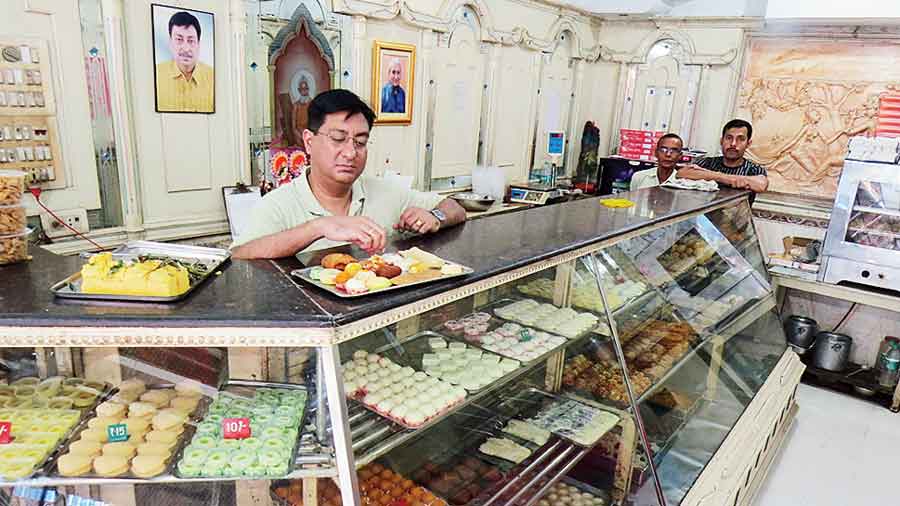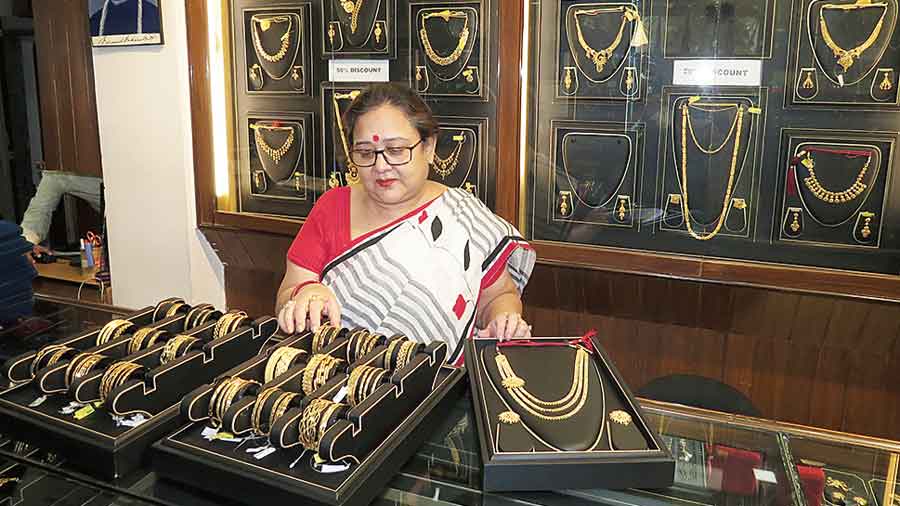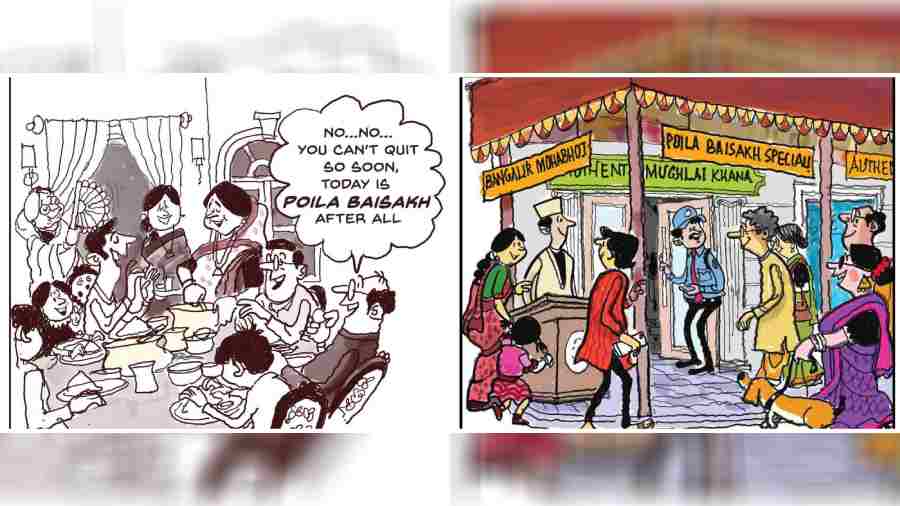The crowd in front of the Kali temple to get one’s haal khata blessed by the goddess may have thinned. But that hardly means the Bengali New Year is just another day on the calendar. There is no dearth of people queuing up in front of restaurants serving Bengali cuisine, evoking nostalgia of home-cooked food served even a generation ago.
Just as some traditions exist only in the memories of elderly residents, others have morphed beyond recognition while a few continue in name. The Telegraph speaks to people from diverse fields to track how much the day has changed over the years.
Sweets
It is a busy day for makers of traditional sweets. "Mishti sales have always been steady during this time of the year. People order sweets in bulk for family reunions. However, earlier most businesses ordered small packets with two kinds of mishti and a snack to distribute among customers on the day. But now some of my old customers order other things like macarons and cupcakes from bakeries or assorted chocolate instead of a good old packets of mishti. Fresh chnanar mishti is a part of our lifestyle. Gifting chocolates and cup cakes is a more western concept,” said Girish Kundu, a spokesperson for VIP Sweets in Bangur Avenue.
Those who consume sweets demand low-sweet options. Prosenjit Sil, co-owner of Kalpataru in CA Market, has seen his purchase of sugar fall from six quintals a month to three quintals. “Less sugar means more chhana being needed. Costing is going up,” he says, adding that standard rates were Rs 4-5 per piece. Now it should be Rs 18-10. “But no one will buy sweets then. So we have to curtail our profit and keep it around Rs 12,” he said. Sil's family has been in the business since 2004. “In those days, so many shops in our market asked us to prepare small packets. They have stopped the practice now, surely due to slow recovery after the pandemic.”
But they will still make the special Nava Varsha sweets — kesar rajbhog, mango sandesh, malai sandesh etc. though in much smaller quality. “Earlier we stopped taking orders a week ago as it was impossible to push production capacity beyond a limit. Now we accept Poila Baisakh orders even the day before.”
Online sales of sweets has gone up in the last few years after the pandemic. “During the pandemic, a lot of our customers shifted online. Earlier we dealt only in cash. Now we havebeen forced to set up an online payment system,” Kundu of VIP Sweets added.
Fish & meat
The fish markets in the township continue to do brisk business on Poila Boisakh. “Everyone expects a feast on this day. Even though mutton is a must, fish is still a staple in most homes. On special occasions, people want chingri, tyangra, ilish, bhetki, koi, etc,” said Gopi Mondal, a fishmonger in CA Block.
Sultan Rafi, a meat seller in CA Market, recalled how chicken used to be a non-entity when it came to family celebrations. “But nowdays, chicken is a big part of the menu mostly because it is cheaper. Also chicken is easy to cook and easy to digest.”
Since this is the month of Ramzan, there is high demand for mutton anyway.
Jewellery
Auspicious days like the start of the Bengali new year and Akshay Tritiya call for the purchase of jewellery, especially gold.
Sujata Pyne, partner at Benud Behari Dutt Legacy in BE Block, recalls two or three rows of customers waiting to buy jewellery for women of the family in the 90s when she worked in a south Calcutta branch. "People would get upset at having to wait. Such crowds are a thing of the past now, especially after demonetisation and the introduction of stringent rules for gold sales,” she rues. These days, she adds, there are more customers coming only to collect the gifts of new Bengali calendar and packet of sweets than buy jewellery on the day.
But the store continues with the tradition of haal khata, bought from Bowbazar on Ram Navami, worshipped in front of Laxmi and Ganesh and the first couple of advance bookings jotted down in red ink on the day. “The rest of the pages go empty as all transactions are now computerised,” she smiles.
Soumitra Dey, owner of Sarada Jewellers in IA Market, recalls the personal touch involved in the interaction with customers on the day.
“My father used to deliver cards to the doorsteps of the customers and a lot of emotion was attached to this custom of haalkhata. All the clients were given a warm reception and gifted treated to soft drinks and gifted calender and sweets. Clients used to clear their dues on the day. The occasion provided a major chance to improve customer relations. Now digitalisation has changed the total scenario. Now invitations are sent over WhatsApp or e-mail. A gift system has been introduced to attract more clients. Commercialisation has set in and people decide on the store to visit depending on the rate of discounts being given,” said Dey.

A selection of sweets on display at Kalpataru in CA Market Sudeshna Banerjee

Jewellery on display at Benud Behari Dutt Legacy in BE Block. Sudeshna Banerjee
Block markets
Most people would draw a blank if asked to name the Bengali year, quips Abhijit Saha, president of CK Market Association of Traders. “All emotions related to the Bengali New Year have been lost. Now it is considered only a date.”
Previously CK Market used to take on a festive atmosphere as every shop used to perform the haalkhata ritual and customers used to visit the shops. “If any of the regular and close customers was unable to come we used to send calenders and sweets to their houses. But especially after digitalisation, the khata system has lost its importance. Only a few shops maintain the system till date. But on the day of Poila Baisakh, a priest comes and puja is performed inside the market premises.”
Rishiraj Ghosh, secretary, IA Market and partner of Dashakarma Bhander, feels that the craze for Bengali new year celebration still exists. “Since we have a temple inside the market many traders can perform their puja inside the market.
Eat out
Most Poila Boisakh evenings would be spent visiting or receiving relatives earlier. With few bothering to cook at home, the accent is on Bengali buffet meals in restaurants.
The new generation also likes partying at pubs in Sector V. Ishita Chanda, a second year hotel management student, said: “After a sumptuous lunch with the family, I usually go out with friends in the evening. We take a long drive in New Town and settle down at a lounge pub in Sector V.”
The change has taken place quite recently. Chanda herself remembers “how important visiting relatives was on this day”.
Additional reporting by Sudeshna Banerjee and Bharati Kanjilal
What are your memories of celebrating Poila Baisakh? Write to The Telegraph Salt Lake, 6 Prafulla Sarkar Street, Calcutta 700001 or email to saltlake@abp.in
